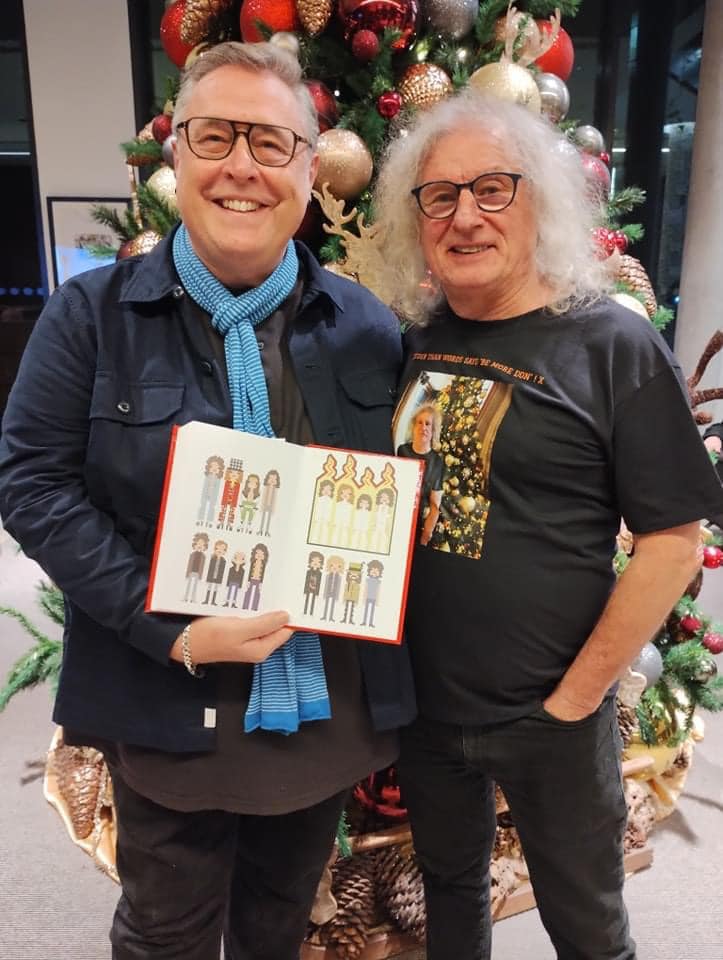
Catching up with fellow author and freelance writer Daryl Easlea recently, we got the mutual backslapping out of the way fairly quickly, complimenting each other on our recent Slade publications.
It’s not just about being complimentary though, preferring the term complementary when it comes to the competition factor. We know full well that if fans of the Black Country’s finest (diehards or perhaps just more generally interested in ’60s, ’70s and ’80s music and culture, and the nostalgia that goes hand in hand) want to buy a Slade book this Christmas, there’s only so much money to go round, so £50 for two books, wonderful as they are, is a tall order. But I’d suggest you at least order both through your library, feeling first-hand the quality and width.
It’s not even a case of choosing between Daryl’s Whatever Happened to Slade? When the Whole World Went Crazee and my Wild! Wild! Wild! A People’s History of Slade. There are other fine Slade publications doing the rounds, not least those up for grabs (yeah, yeah, yeah) from fellow long-time fan Ian Edmundson and the band’s unofficial historian Chris Selby, equally busy in the year marking the 50th anniversary of Slade’s most commercially successful year.
Before we get going, a little about Whatever Happened to Slade? When the Whole World Went Crazee, in which Daryl endearingly tells the band’s story alongside personal histories of Noddy Holder, Jim Lea, Dave Hill and Don Powell, in his own inimitable style, charting their emergence from the ’60s beat boom, their initial successes, their glam heydays and attempts to crack the US. He also covers cult 1975 film Slade in Flame in depth, their re-emergence as hard-rocking heavyweights, their final dissolution, and their post-Slade careers. Drawing on hours of new interviews and meticulous research, there’s a foreword by Bob Geldof and an afterword by Jim Moir, the author reassessing a treasured band that won hearts across four incident-filled, bittersweet decades.
One of his Record Collector pals called it a ‘comprehensive analysis of all things loud and yobbish,’ suggesting Daryl ‘walks us through a long-gone world that is both vivid and chaotic.’ I’d agree, and the man himself adds, “Although The Beatles were my earliest love, Slade were the first band I found myself and the first pop poster I had on my bedroom wall. There was something so exciting, so vibrant, so dangerous about those singles, they just leapt out of the radiogram at you in a way few others did. Slade are one of the last bands of such magnitude to receive a serious reappraisal, as they are so much more than the cartoon image of them that prevails. It is a story of surprise and wonder, of the underdog at an extremely evocative time.”
I’m genuinely pleased that Daryl and I covered similar ground and quizzed many of the same contacts for further info and views yet ended up with very different books, despite each of us affording space in our respective publications to many of those who kept Slade’s (ahem) Flame burning down the years – from manager Chas Chandler to roadie Graham Swinnerton and on to the band’s fans’ champion, Dave Kemp – and many more who gave their own takes on the group, including Gered Mankowitz, Paul Cookson, David Graham, Stu Rutter, and the afore-mentioned Edmundson-Selby writing partnership.
And there was another factor at play in the process of delivering these publications that we both had to deal with – gingerly navigating our ways around the Slade experts out there. Most of whom are friendly and approachable, lovely people, I should add, but often fiercely protective (albeit with good intentions) of that wonderful legacy. It was a bit of a minefield at times, I suggested to Daryl.
“I wouldn’t know what you’re talking about.”
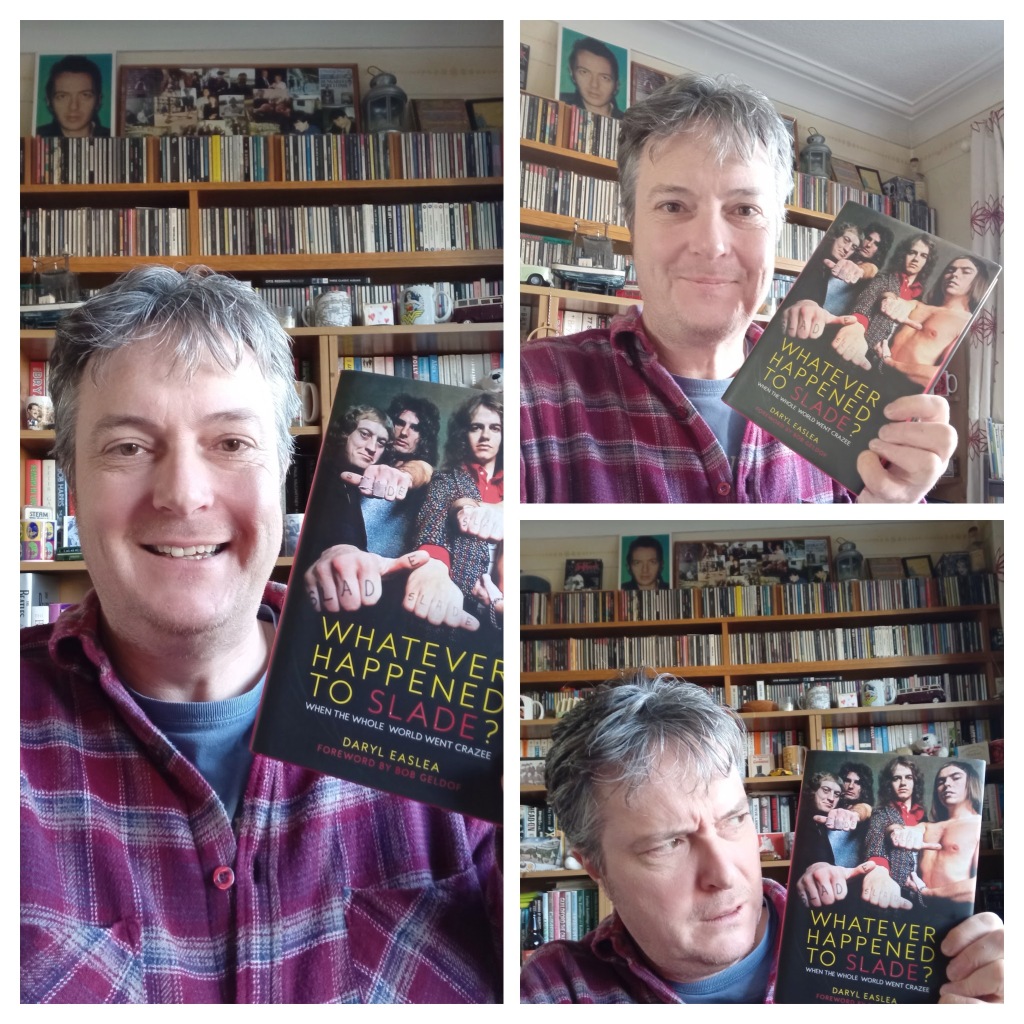
Was that a wry grin directed my way on our WhatsApp call?
“Erm… But it’s great to see some of the same characters recurring. And why I think the two books work is that you can read about it in mine, then read someone’s reaction to the moment who was there in yours. I think they’re perfect partners in that sense.”
Daryl’s wisely keeping out of it, but I still feel a need to vaguely mention some lesser publications out there – some with awful fonts, lacking layouts and half-arsed content (often half-inched straight off t’interweb, most likely authored by AI). Arguably, that impacts less on Daryl – we know the quality we’ll get with his writing and Omnibus Press’ production. Yet others may have shelled out on shabbier publications and now fear they’ll get the same shoddy quality from an indie publisher. So this is my chance to say that’s not the case with anything my publisher, Richard Houghton produces at Spenwood Books, as feedback received confirms.
Anyway, enough marketing bolleaux. Let’s move on to the interview proper, once Daryl’s added one more plug…
“All of those things are what they are, but when you look at the quality of The Noize, I think that is an astonishing piece of work.”
That’s the Edmundson-Selby book series, with links for that too at the end. As for Daryl’s book, he’s keen to praise Michelle Hickman, aka 8bitnorthxstitch, for her original cross-stitch artwork on the endpapers.
“I really love her work. She did this thing with all the members of The Fall. I edited a Record Collector Fall special, and she’s in that too. I suddenly thought, wouldn’t it be fun… turn the sort of cartoon thing on its head a bit, because the first thing you see {in the book} is a form of cartoon of them {Slade}. And there’s a mug with it, and a poster you can buy. It does it very well, and it’s all genuine cross-stitch.”
This being what I assume is a fairly typical conversation with Daryl, we dart hither and thither throughout, soon veering on to the subject of past WriteWyattUK interviewees Smoke Fairies (he’d just caught them live and was mightily impressed) and Wreckless Eric (ditto), before we get back to the main subject matter. He even let it slip that he was off to the University of Warwick, where his daughter is studying, to see Steeleye Span, another band who had a festive UK hit in 1973, ‘Gaudete’ at No.14 while Slade were No.1 (their sixth chart-topper and the third of their singles going straight in at the top) and Wizzard were at No.4, with Elton John’s ‘Step Into Christmas’ the fourth highest, barely reaching the top-30 first time around.
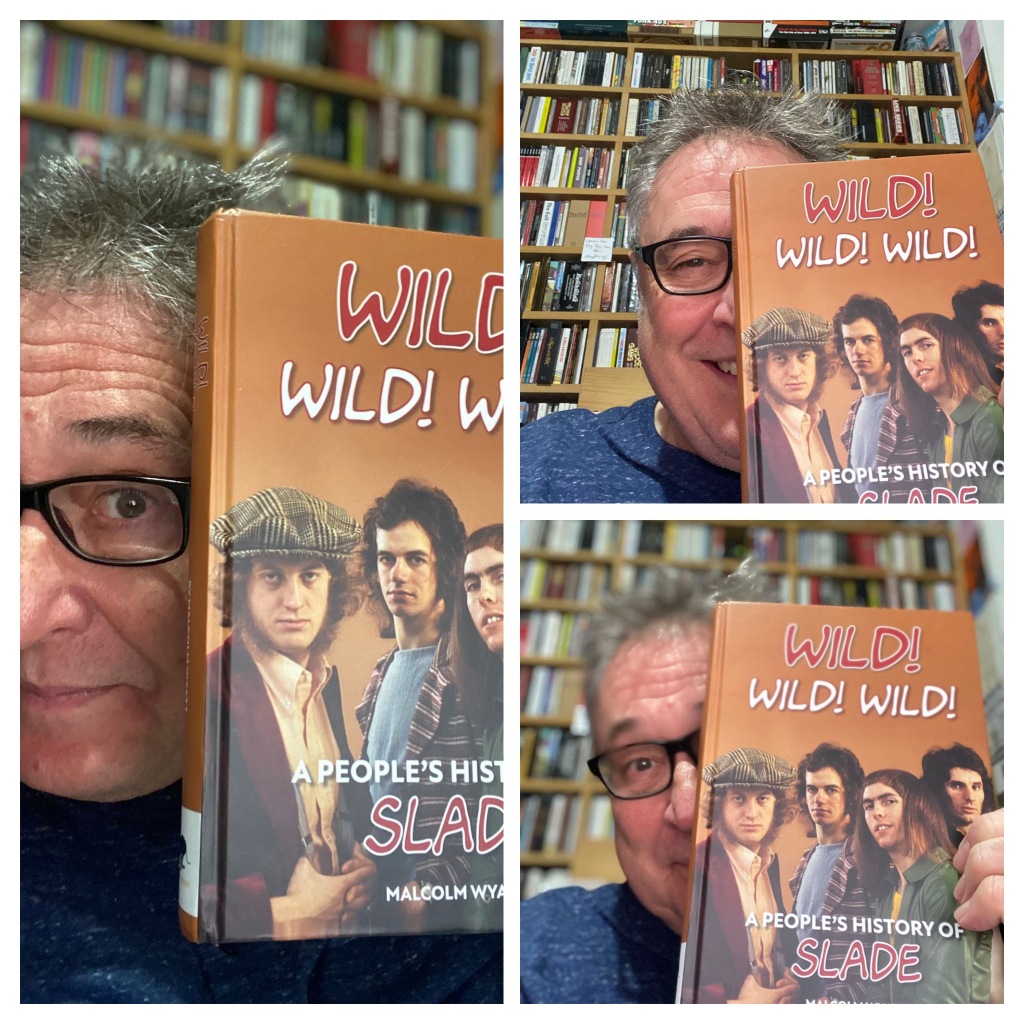
Let’s face it, Essex lad Daryl’s a busy man, between freelance writing duties, talks and stints as part of his Middle Age Spread DJ collective (grown up disco for those unafraid to dance). He was certainly a hard man to staple down at Louder Than Words at Innside, Manchester, a few weeks ago, to the extent that I now have Don Powell’s signature in my copy of his Slade biog, but not the author’s. In fact, it turns out that Daryl never got round to asking Don to sign his. We should do a swap.
Whatever Happened to Slade? When the Whole World Went Crazee is written with genuine love, everything that should be in is within those pages, and lots of interesting nuggets and background make it for me. For instance, when you talk about Ambrose Slade and detail the Gunnell brothers’ management, a period I’m intrigued by – looking at Soho and London at the time, and the part Rik and Johnny G played on that scene. Not least as I love Georgie Fame’s Rhythm and Blues at the Flamingo (Rik introducing Georgie’s set in Wardour Street that night, and writing the LP sleeve notes).
That level of detail is just one example of the colour Daryl adds. Having recently completed my Wild! Wild! Wild! A People’s History of Slade 2023 World Tour of Lancashire Libraries, many a time there and talking to radio presenters I’m asked more obvious questions like ‘will Slade ever get back together again?’ and ‘how much do they make each year from ‘Merry Xmas Everybody’?’ But that doesn’t interest me. I want nuggets. That’s how I approach my feature/interviews, not asking standard questions interviewees tend to trot out glib responses to without properly engaging or giving any real thought. And Daryl takes a similar approach, as illustrated in his detail from throughout Slade’s long career.
“As you know, they were sort of removed from the scene, but there was an association, you know – all the people Chas {Chandler} brought with him were the cream of the London scene. And if I hadn’t made contact with these people over the years… Chris O’Donnell is incredible, a sort of secret weapon. There’s a great story about Chas having a go at Phil Lynott, saying, ‘You’ve got to do it better than that, son, or you’ll be off the tour.’ Chris went on to become Thin Lizzy’s manager, but he started with the Gunnells, and is still working now, at Live Nation. Such knowledge, and a lovely bloke.
“When you join all that up, it’s like, ‘So that’s why the Gonzalez horn section was used!’ {on Slade in Flame} – because of the connection Chas had to know them and get them in. And for me, finding out Steve Gregory played the flute on ‘How Does It Feel’…!”
I don’t tend to add many exclamation marks, but Daryl’s still on a high discussing the wonders of that film, its soundtrack, and his own research, finding out about the accomplished musicians who helped put that LP together alongside Slade.
“I looked at all the other books and referenced the work, making sure the crediting was in there – the work Chris Selby’s done, that Dave Kemp did, and that amazing detail out there. But then {it’s about} bringing the bits to life around it, the context, and why they were there that night or what happened at that time.
“It was things like seeing the horn section listed on the back of that record. To me, the thing that makes that record is the flute. When that flute’s doing the semaphore, who played that? I got Chris Thomas and various people to find Steve Gregory. We had this quick interview on the phone, just to say, ‘Yes, it was me.’ He was coming to my launch in London where Helen O’Hara {ex-Dexys Midnight Runners} played, to play the flute, but in the end he couldn’t.
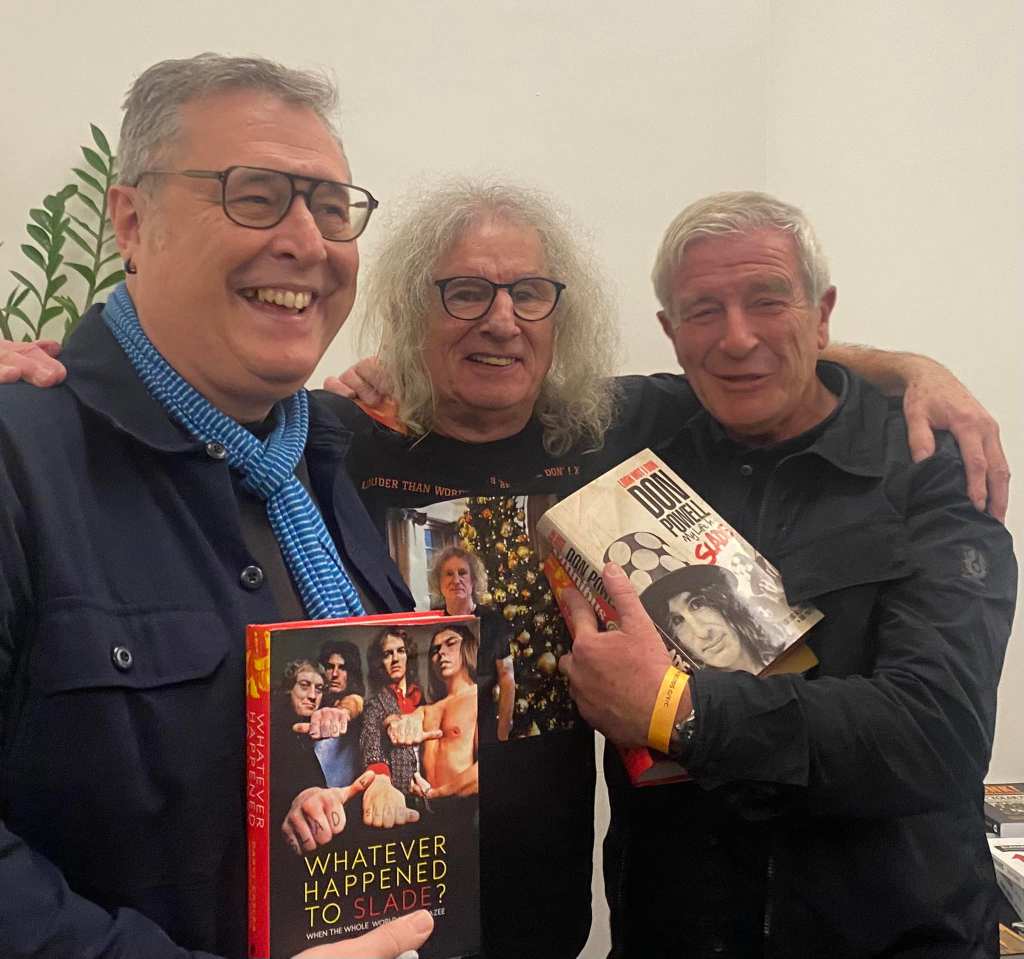
“But that’s what I wanted to do – treat {Slade} like another person would treat The Beatles or treat The Pink Floyd, not just…”
At this point Daryl lapses into an impression of a more neanderthal cliched revelation about Slade, as if revealing for the first time that they were loud and loved, and wore garish clothes. That said, those aspects are also extremely well dealt with in his book, including in the case of the latter, some wonderful insight from H’s costume designer, Steve Megson.
From there, I got on to Slade’s timeline and the fact that while I’d struggle to remember exactly what was going on, music-wise, in late 2016 as opposed to late 2023, I remain astounded that there were barely six years between The Beatles’ Abbey Road and the Sex Pistols’ ‘Anarchy in the UK’. And that was more than six months after the release of the debut LP by the Ramones, who loved ’50s rock ‘n’ roll and ’60s surf music, but also took inspiration from Slade.
And there’s another case in point – while The Clash sang, ‘No Elvis, Beatles, or the Rolling Stones in 1977,’ so many of my punk and new wave heroes turned on by that band, The Jam, the Pistols, Ramones and Buzzcocks took inspiration from Nod, Jim, Dave and Don as well as Bowie, Bolan, Mott, and so on. In fact, as testimonies show in Wild! Wild! Wild! A People’s History of Slade, those iconic Top of the Pops appearances and live shows influenced many acts that followed.
What’s more, while we tend to categorise and put things in boxes, when I hear Ambrose Slade cover Marvin Gaye’s ‘If This World Were Mine’ on Beginnings, I hear a band that bonded over soul music as much as any other genre, thinking – for example – of Jim’s audition, launching into Otis Redding’s ‘Mr Pitiful’ at Wolverhampton’s Blue Flame Club in February 1966; and the band expanding their set with a few soul covers in residency at the Tropicana in Freeport, Grand Bahama, a couple of years later, the ‘NBetweens still finding their way. It was never just about psychedelic pop, beat and rock, Beatles numbers, and rock ‘n’ roll.
“Yeah, and I think {that’s the case} with all those ‘overnight successes’ at that time. At Record Collector we’ve done this Roots of Glam special {O, Cum All Ye Faithful, linked here}, and all of them had a past, apart from maybe Roxy Music. There’s also that difference between glam and glam rock. When you think Gary Glitter was going in 1960, Bernard Jewry {later becoming Alvin Stardust} was with Shane Fenton and the Fentones in 1962…
“And when they hear ‘You Better Run’ by the ‘NBetweens or before that ‘Don’t Leave Me Now’ by The Vendors or ‘Sugar Shack’ by Steve Brett {and the Mavericks}, people are aghast, because they thought it began with ‘Coz I Luv You’ or ‘Get Down and Get with it’. But like any other band they did their time, learned their chops, did their 10,000 hours. And they were so ready to do what they did.
“And that’s the lovely thing about your book, where you’re talking to people who saw that happening, saw that evolution.”
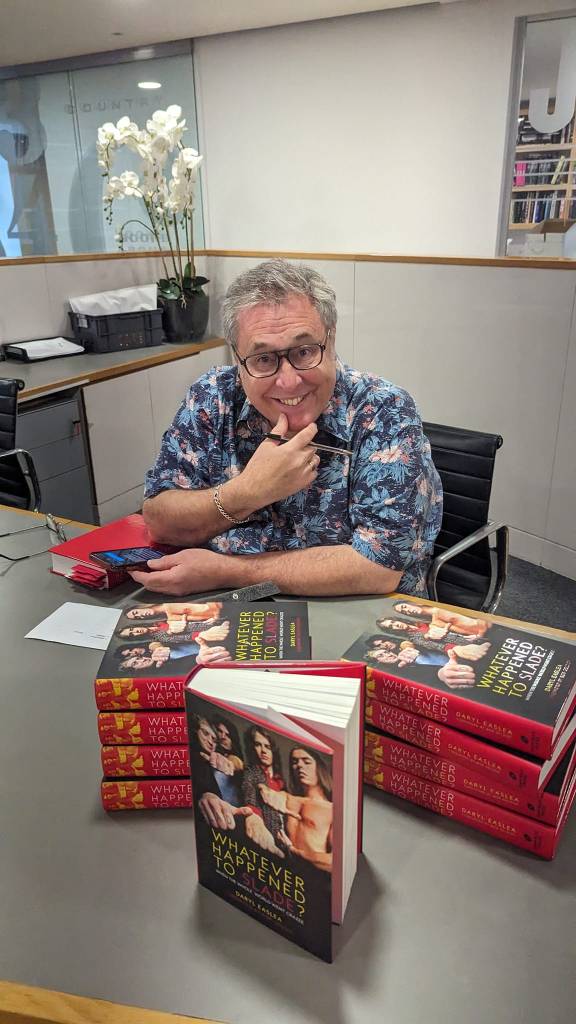
True, and I love the tale, for instance, of a young and impressionable Chris Selby on the top deck of a double-decker bus in the Black Country in late 1969 spotting these skinheads, finding out they were in a band and that one was called Noddy Holder – cue schoolboy sniggering – then going to see them in a community hall, where they were already ‘slam-against-the-wall loud’. Those stories make it for me. I’m not so interested in how they swapped the fifth song in the set at a uni show in ’82. And while I love the eyewitness reports from Reading Festival, I felt I knew a fair bit of that story already.
“Well, what I’ve learned is how little people do know! When I’ve gone, ‘We’re gonna do Don’s crash week, or Reading, or Flame {at one of my events}, most people genuinely don’t know. One of the greatest accolades I had was a guy who’d been in the music business for years, and was absolutely Bowie and Bolan through and through. He came to the launch, Liz Lenten and friends (who Daryl named Nicky-Nacky-Noo for the night. When Helen O’Hara played ‘Coz I Luv You’ they became Nicky-Nacky-Noo-Rye-Ay) did three songs, and he said, ‘You know, I’m gonna go back and listen to all these songs. I can’t believe how well written they are.’ And some 20-year-old from Liverpool reviewed the book and said, ‘I had no idea, I’ve gone back and listened, and in a way it’s a perfect storm – there’s a group with a perfectly-formed collection.’”
At that point, we head off track again, in this case talking about Paul McCartney, as Daryl was in the midst of curating a Record Collector Macca special, admitting hidden depths there that he hadn’t previously fully appreciated.
“I was listening to records that have legendarily been slagged off that I never bought because of it, and actually, they’re better than most people’s entire output.”
Agreed. Even when the production is somewhat of its time, the songs are there.
“Oh, I mean, Off the Ground especially. When that came out, his stock started to plummet. I was working in a record shop. I knew ‘Winedark Open Sea’, but ‘Golden Earth Girl’ and ‘I Owe It All to You’… I mean, Christ, they’d be someone’s greatest hits!”
Getting back to the mighty Slade, I let on that I never owned Chris Charlesworth’s Feel the Noize! late ’84 illustrated biog. I’d moved on at that point, the cover didn’t entice me back, and it’s been fetching silly amounts as long as I’ve been searching for it since.
“Well, there was one copy that Omnibus had in the office. I had it for years, then gave it back at the launch. It was very good… and what’s fascinating is that {as} with George Tremlett’s book they were just about to conquer America… ‘Run, Run Away’ was in the top 20 there. Jim was poorly but they were still going to go back and do it. So they both ended on relative highs. And Chris did brilliantly – he spoke to Swin and all the relevant people at the time. But it’s more sort of sex, drugs and rock ‘n’ roll, written in a very sort of 1984 way.”
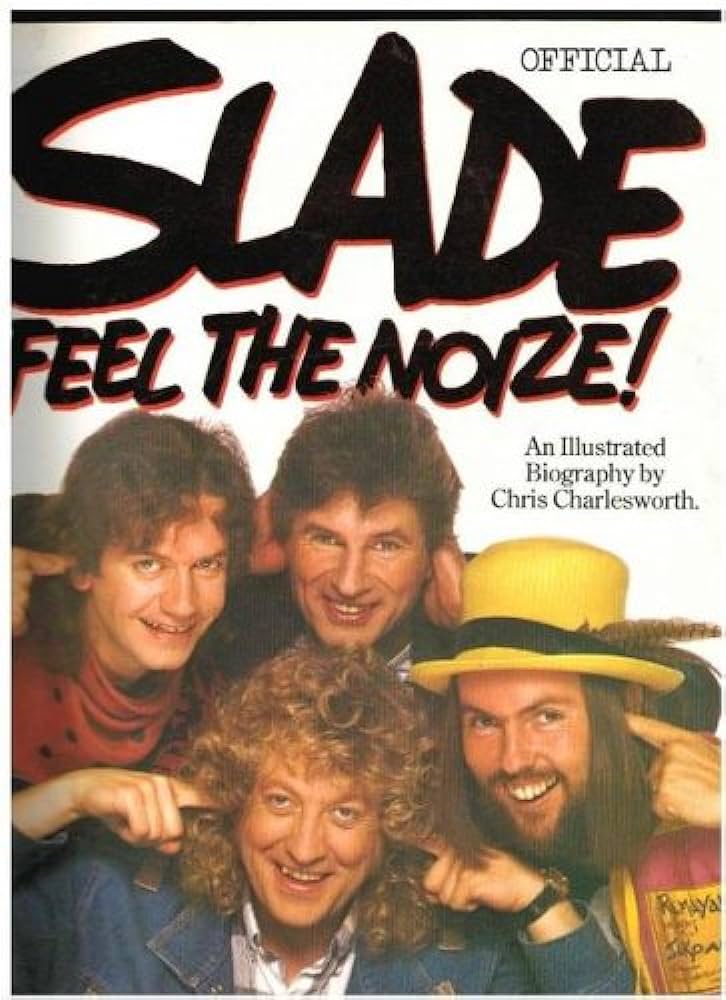
Not Orwellian, I’m guessing. As for the Tremlett biography, The Slade Story, that’s the first rock bio I read, borrowed from my brother. It was only later, re-reading it, that I realised the dates didn’t always tally up, the ages of the band somewhat inventive.
“All those Futura paperbacks were very central to people of our age’s love of music. There’s a whole bunch of people in their mid- to late-50s now who were kids then, growing up when The Beatles had gone but very aware of them. Then people started mythologising about rock ‘n’ roll, before Grease, Happy Days, and all that. Suddenly, you could read about all that. There was Rick Sanders’ Pink Floyd one. I had that when I was 10, there was the Slade one, a Paul McCartney one, Howard Mylett’s Led Zeppelin one… it was, ‘Wow, this is what I want to do!’”
I agree, but have to say the more in-depth biogs from that era and beyond, chiefly concerning film or music stars, like ex-Rolling Stone editor Chet Flippo’s 1988 study of McCartney, were too ‘warts and all’ for me, putting me off being a rock biographer.
“Well, my editorial {for the Record Collector special on McCartney} is like, ‘I’m glad I’m doing this now and not 10 years ago’. That space between the two Glastonburys, when it was all, ‘Exhibit A, the Frog song,’ blah, blah, blah. But to look at it from this distance, fortunately, he’s getting the respect he deserves, and I think that’s wonderful.
“But you’re right, in that era the books became like, ‘Oh, they’re all bastards. He was this nasty piece of work.’ But now we’ve seen Get Back and realise, actually, he was the one desperately trying to keep them together, in the most positive way, when the others didn’t really give much of a shit.”
Based in Leigh-on-Sea and also a DJ, presenter and A&R consultant, Daryl began writing professionally in 1999, becoming deputy editor of Record Collector in 2000. He remains a regular contributor there and was appointed editor of The Rare Record Price Guide last year. He also writes for MOJO and Prog, his work appearing in The Guardian, Uncut, The Independent and The Glasgow Herald, among other publications.
His hefty CV also includes his curator’s role for Decca’s 90th anniversary celebrations and as co-editor of Decca: The Supreme Record Company, while his talks on pop music, Fast Forward, have been performed at festivals, the British Library, and the V&A. Then there’s monthly broadcast, Easlea Like A Sunday Morning on Ship Full Of Bombs/Thames Delta Radio (found via www.sfob.co.uk). And his past subjects in book form have included Everybody Dance: CHIC & the Politics of Disco (he was ‘born to dance’, apparently), Without Frontiers: The Life and Music of Peter Gabriel, and Talent Is an Asset: The Story of Sparks.
Regarding the latter, one of my big moments, I tell him, was interviewing Ron Mael, which like talking to Don, Jim and Dave, or getting Suzi Quatro and Andy Scott to write my book’s foreword, proved one of those special ‘if only my eight-year-old self could see me now’ moments.
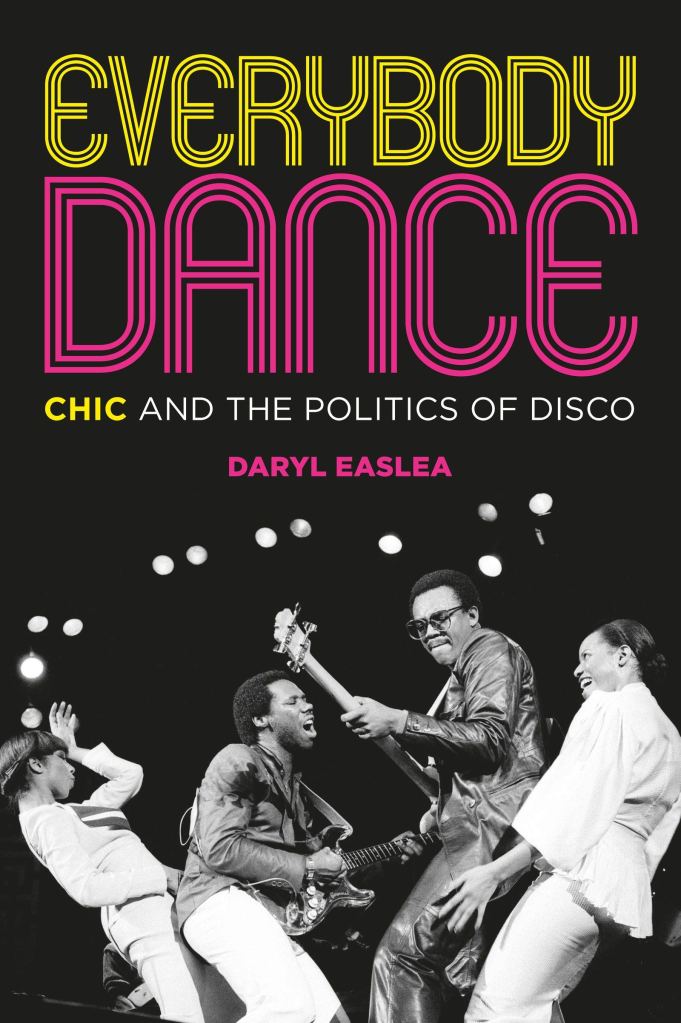
“I think that is the beauty. And if you can retain that when you write… and what I’ve seen of your writing, it’s how you can allow that inner child to come out in your writing, without appearing a prat, with that ‘If my 16-year-old self knew what I was doing…’
It is a bit of a cliché. I think I’ve been guilty of that.
“Well, I look back at some of the things I’ve written quite recently and sort of wince, thinking, ‘Oh, maybe I was a bit too ‘fanboy’ there. I mean, reviews are lovely, and I make money – not a lot – from reviewing stuff, but I’d rather not review something than slag it. Just constructive criticism. If I’m going to get a book or record I really hate, give it to someone who might like or understand it better.
“When you write a book, you put yourself on the parapet. And when you write about Slade you become very aware how dear they are to so many people… a small but perfectly-formed group who are obsessed with them… which is why I made sure I had David Graham and Chris Selby and Dave Kemp as sort of spirit guides. Chris and I spoke weekly, daily, all the way through, with plenty of, ‘What about this?’
“I was very aware that I was this Little Lord Fauntleroy coming up from the south with big words and all that, but you don’t spend that long on something if you’re going to do a hatchet job – why bother?”
I had a similar response at first – ‘are you really a fan, why have I not heard of you before?’ It seems that was the case for you when you did an event in Bilston in 2017, but you at least had a head-start. I like the fact, however, that independent of each other – because I didn’t know who you’d spoken to – we sought out the same players and chose to pay tribute to the same people no longer with us. And while I only ever had limited exchanges with Dave Kemp, via social media, I felt he knew I was genuine. He came over really well.
“Dave was lovely, and I think because it was on Omnibus, and Chris Charlesworth gave me the intro, I met him on day one, we did a four-hour interview, and he gave me his scrapbooks. There was plenty of stop and start and a major project with Decca for their 90th anniversary took me away. But those scrapbooks went back to him, and the last time I saw him was when he was managing Slady. Wendy {Solomon, aka Jem Lea in Slady} has been a friend for 15 or so years, and I was there the first night they came together.
“That was the last time I saw Dave, and he was so kind. He’s the person that ran the fan club, and ‘gatekeepers’ can be incredibly possessive, or divisive, or whatever. But he was none of that. All of them, whatever side they’re on, have all been very pleasant. And all I want to do is celebrate their group.”
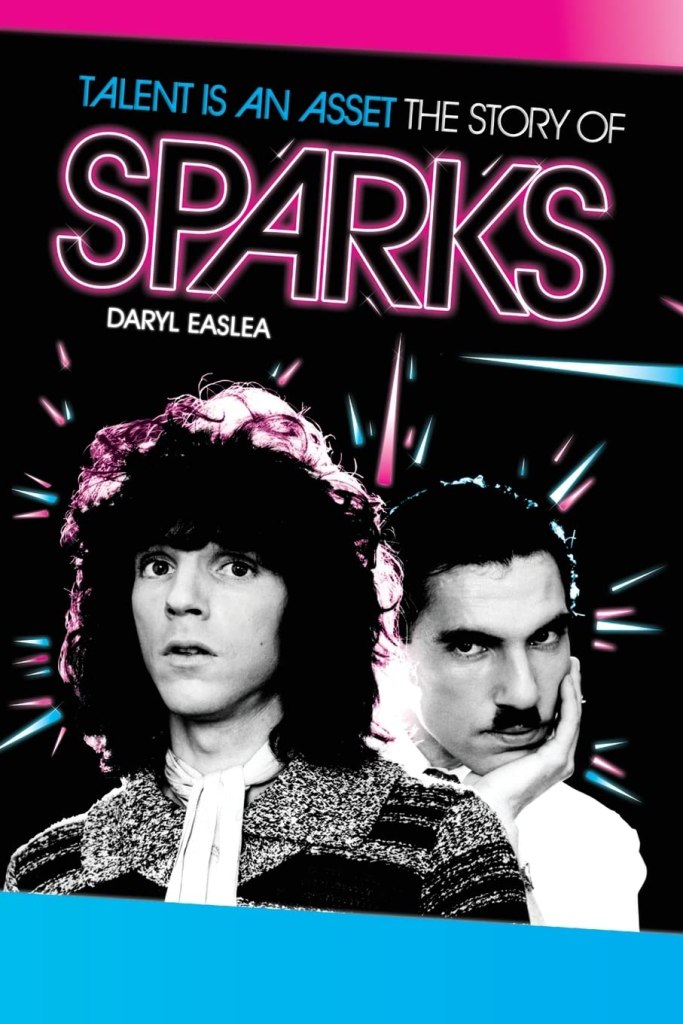
That comes over in every chapter.
“I mean, I’m not in love with everything they did. Anything after 1983 is a bit sort of… but the songs are still there, y’know.”
I know what you mean. It became Slade by Numbers with some of the later grand ballads, but a few still get hairs on the back of my neck up. They weren’t cool by then, but could still write a great song, as I think Jim is still proving, delving back into his catalogue, reinventing a few of those numbers.
“Ah, Jim just can’t stop. The stuff he does at home now, in 1975 It would have been No.11. I don’t think it leaves you. A bit like Paul McCartney, he’s a melodicist, or whatever they say, and does it phenomenally well.
“Anyway, have you asked me a question yet? Ha ha!”
It has been that sort of interview. But go on then – is the book selling well? It seems to be from where I’m sat. You did a roaring trade at Louder Than Words, with Don Powell in tow.
“Yeah. It’s been in and out of the Amazon Rock Top 20 or whatever, up to about No.7. Not that I spend my life looking at it, but I do from time to time. And everything above it was like Bernie Taupin’s book, Barbra Streisand’s book, Boy George’s book, a Taylor Swift fan magazine…
“For quite an obscure group in the sense that, you know, it’s not Barbra Streisand, it seems to be… as much as rock books sell.”
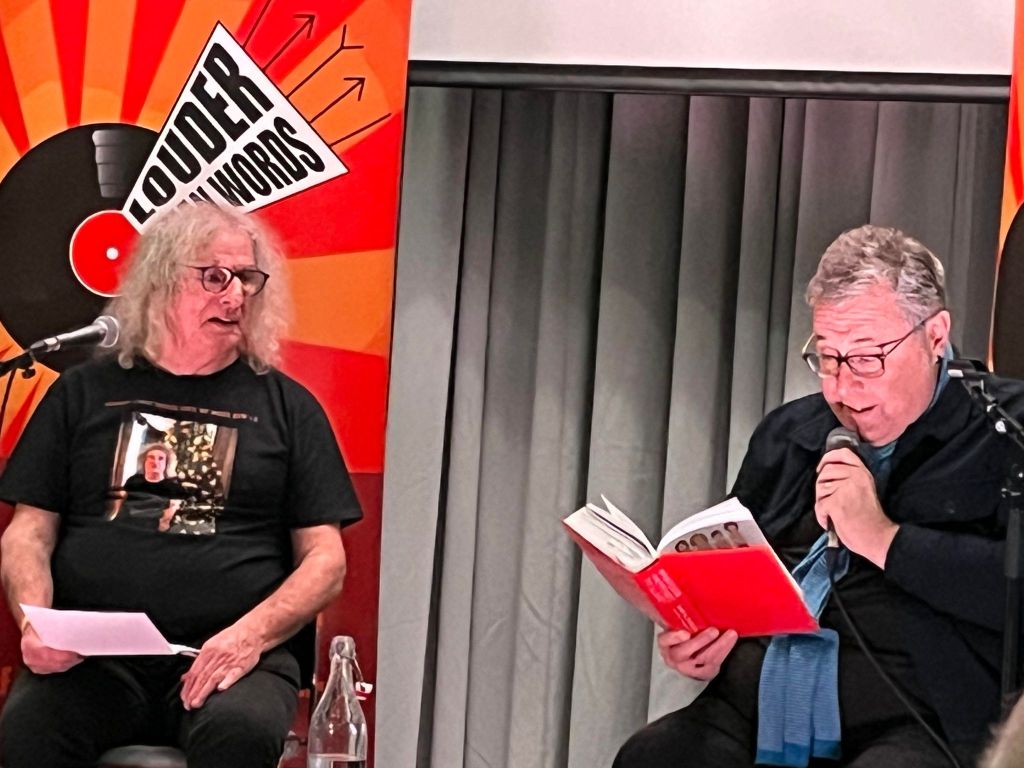
We’re not making much money out of this business, are we.
“No. That’s why we do so many other things, but fortunately in my case related to what I do… so I’m not having to go and work somewhere else.”
One of my favourite pieces in Wild! Wild! Wild! Is a piece by Belfast city tour guide Arthur Magee, about how important ‘Merry Xmas Everybody’ was to him back then at the height of The Troubles, five decades ago. It genuinely moves me, being an everyman tale I can relate to, despite being brought up on a council estate in leafy Surrey. It’s instant nostalgia, takin’ me bak ‘ome, as Slade always do at this time of year. And when I do talks, it’s a story people pick up on and bring up afterwards, recognising many of the themes. And that’s what I wanted to convey with this book.
“That’s absolutely right. The thing is, you work on that fact that people’s childhoods have this tremendous resonance, and I think the way the world has turned to shit, really makes me look back. You don’t need rose-tinted glasses. It was simpler, we were happy with what we had, we weren’t told to have everything. As David Stubbs said in my book, your Christmas present lasted until your birthday present, and I think people love to go back there.
“Just hearing that harmonium at the start of ‘Merry Xmas Everybody’, it’s like someone’s put a lovely cloak around you, full of nostalgia. And we’re of an age where parents are no longer with us or older brothers are no longer here, and we’ve all lost people, however near or far they are.
“I mean, why are Morecambe and Wise still on the telly at this time of the year? And why are we so obsessed with The Beatles? What I really enjoy is that my daughter is so unsentimental, whereas I can see a paperclip and start tearing up!”
I know what you mean. My better half and I were trying to explain Quink Ink to our foster lad the other day, me thinking, ‘How on earth can I be nostalgic about that?’
“I still have an old-fashioned Halifax savings book, but they sent a letter yesterday saying they really are no more. I think when I go into the Halifax, they think here’s the eccentric coming in on his penny-farthing!”
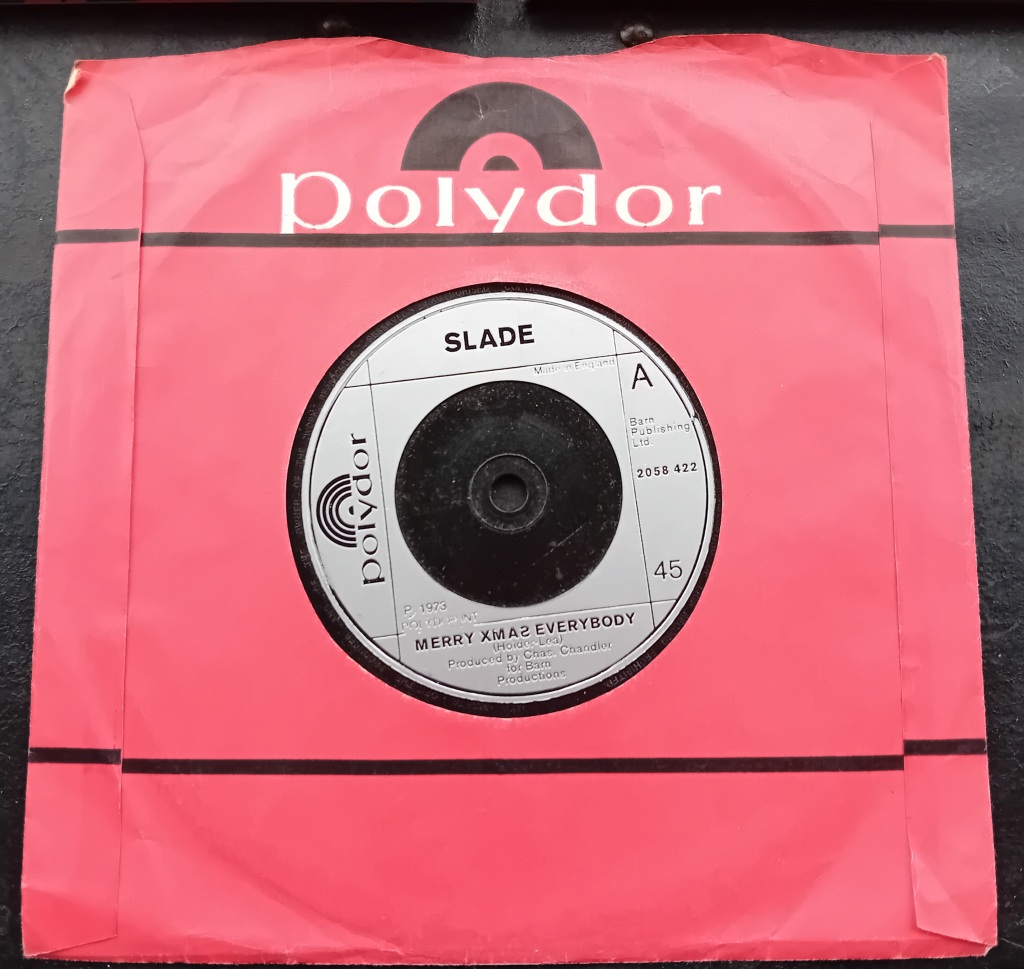
Incidentally, I worked for nine months at the Halifax Building Society on first moving to the North West, 30 years ago, before retraining as a journalist in Preston. And I see your background was with Our Price from 1979 to 1997.
“Well, WH Smith’s record department first, then Our Price came to town. Smith’s was the third or fourth record shop in town when I was growing up. We didn’t have HMV or Our Price. It was better than Boots.”
Actually, I worked in Boots, Guildford in the mid-’80s… nipping to the record department at lunchtime to buy vinyl with my staff discount.
“I was offered a job in Boots the week before Our Price came along! I’m of that era where I knew exactly where I bought all my records. For instance, David Bowie’s Lodger was in a sale in Keddies, our town’s department store. It’s still got the stickers on it.”
Anyway, getting back to that career progression…
“I was going to university or to drama school, having places at both, but took a year off and was a store manager at the age of 19, which now I think about it is horrifying. Our Price Romford was my first job, and Our Price Southend my first manager’s job. I’d sit there, the public only there {he’s pointing, always good on a WhatsApp link}, and at Christmas I’m sat with a fag on, counting £10,000 in notes.
“But the skills it gave me… The main thing is that you know you have to get up and do something. I went up north with the job, and Preston was one of mine, Southport, Wigan, St Helens, Blackpool…”
You could well have served me, fresh up from Surrey, having visited for five years before relocating.

“I’m so glad I was with Our Price. I found out what a great place Preston was, and Lancaster, Blackpool, Wigan… You have this image of the north, growing up in the south, but I remember seeing Bolton Town Hall, thinking, ‘My God, look at this!
“Then Our Price got taken over by Virgin, which was fine, but they were very suspicious of Our Price – we were all a bunch of bloody hippies! I was offered to go to a megastore, become a regional manager, but I went to university {in Keele, Staffordshire}.”
That sounds a similar path to mine – out there in the working world after my A-levels, in my case locking up as much as a million pounds at a time in a walk-in safe, barely 21 – similarly horrifying me now I think of it – and later travelling the world then switching jobs, not getting to uni until I was 28, a miserable short spell in banking sharpening my resolve to retrain, aided by a supportive partner.
“It is amazing. I suppose it’s the same now, seeing kids go into retail or banking. But maybe those sums of money aren’t there anymore. It was a great grounding though.”
It also makes you realise what you really want to do with your life.
“Although I was really happy. I loved it. I worked exceptionally hard. That night in Manchester {at Louder Than Words} three of my colleagues and one of my managers were there – we all had areas in the north. I only knew one was coming, so that was lovely. We’ve maintained a friendship and learned an incredible amount.”
And you got experience in DJ-ing on student radio?
“Yes, Kube Radio, which I think still exists on the internet. Again, the people were great. One is Claudia Winkleman’s producer on Radio 2 now. Someone else worked for Yorkshire’s tourist board, really senior, and I’d come straight out of retail so started running it like a shop. Before me, the guy who ran it would just spark up a bifter. I could also do that, but it was like {being frantic}, ‘Right, we’ve got to do this… we’ve got to do that…’
“I never thought I could go to university – I wasn’t clever enough. But my wife had been before me, and she went later as well. And I ‘grew down’ – I had my childhood at 31… through to, well, 57! But when I was 20, I was about 53!”
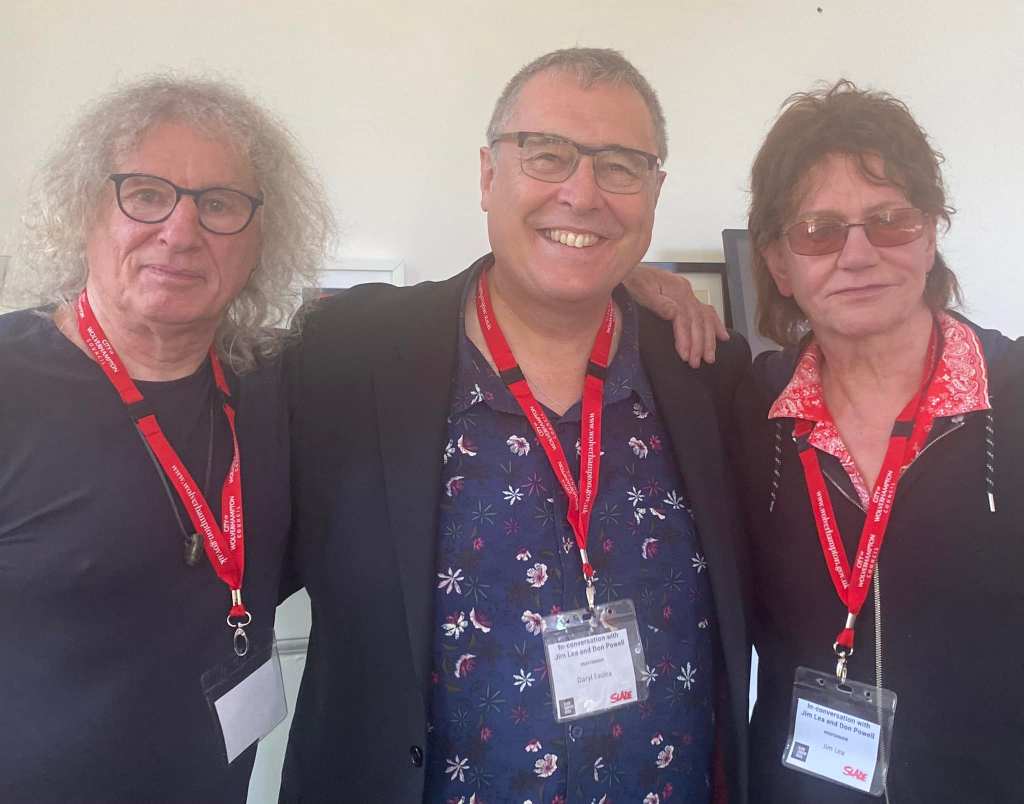
Whatever Happened to Slade? When the Whole World Went Crazee by Daryl Easlea (Omnibus Press, 2023), billed as ‘the first serious biography of the group in over three decades’, is available from all good bookshops and online stores, with more details at www.omnibuspress.com. You can also keep in touch with Daryl via Twitter.
As for Wild! Wild! Wild! A People’s History of Slade, it features more than 350 accounts about the band – live sightings, appreciations, and key moments – from down the years by close to 300 contributors, be those committed fans or musicians who played alongside the band or were inspired to follow their lead.
There are also excerpts from Malcolm Wyatt’s interviews with Dave Hill, Don Powell and Jim Lea, further insight from Noddy – with permission from the interviewer – and forewords by glam legends Suzi Quatro and Andy Scott (Sweet). Contributors include members of Status Quo, The Beat, The Jam, Lindisfarne, The Members, The Selecter, The Specials, The Stranglers, The Style Council, The Undertones, The Vapors, The Beautiful South, Carter USM, The Chords, Dodgy, The Farm, Folk Devils, The Loft, The Wolfhounds, The Wonder Stuff, and The Woodentops. Legendary photographer Gered Mankowitz, ‘80s pop icon Nik Kershaw, children’s author Cathy Cassidy, music writer John Robb, and Slade poet laureate Paul Cookson also feature.
There’s still time to order before Christmas direct via Spenwood Books or online via Amazon, or you can try before you buy at your local library or order through your favourite bookseller. You can also track down copies in my old hometown at Ben’s Collector’s Records, Tunsgate, Guildford, Surrey, or Action Records, Church Street, Preston, Lancashire.
And for more detail about Ian Edmundson and Chris Selby’s six-book The Noize series – namely The Noize: the Slade Discography; Six Years on the Road: 1978 – 1983; Did You See Us?; Slade on 45 (Volumes 1 and 2); and the newly added Prime Cuts: A Barn Records Singles Discography – head to the authors’ Amazon page.
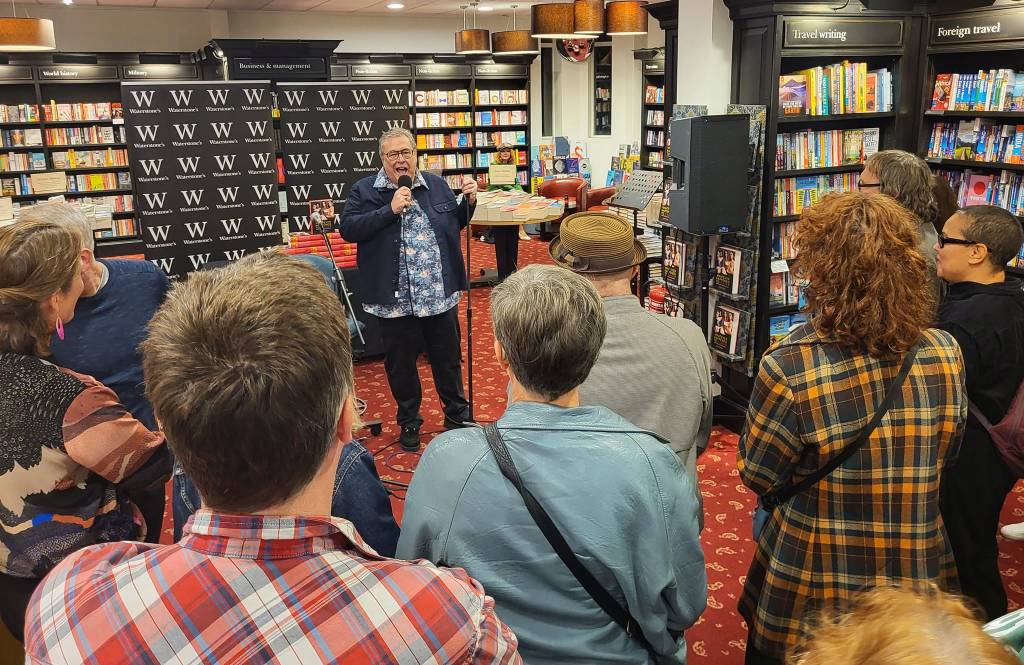

Bloody ‘ell Malc. There’s enough here to take me through to New Year!
Seriously though, great stuff. I really had no idea your book could be just the beginning of a major Slade library.